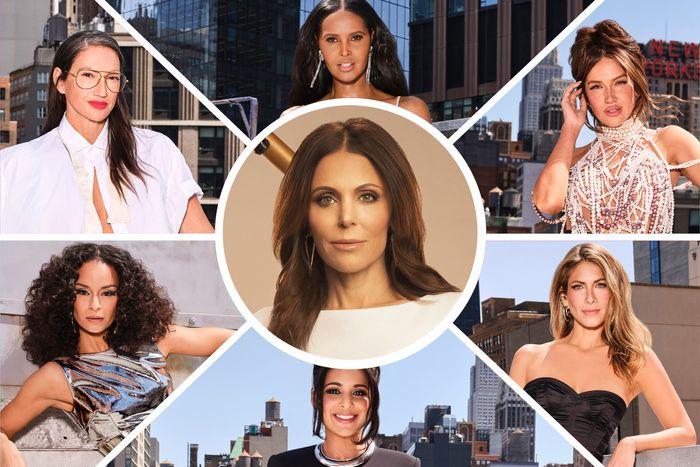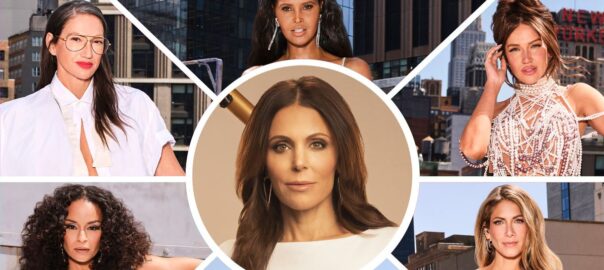[ad_1]

The RHONY reboot remixes one of the franchise’s most compelling archetypes. But who will claim the mantle?
Photo-Illustration: Vulture. Photos: Bravo
As in Little Women or The Baby-Sitters Club or Sex and the City before it, one of the chief pleasures of the Real Housewives franchise is brushing past the particular humanity of each individual female character in order to turn them into sweeping archetypes. Sure, Vicki Gunvalson is a real person, but also, when considering the toxic dynamics of some terrible friend drama, who’s the Vicki Gunvalson in the group? This same logic holds within the franchises themselves. Someone has to fulfill the chaos demon or goody two-shoes or fun-loving free spirit roles, and as some cast members diminish and go into the west, who steps up to take their place? In this context, the new reboot of Real Housewives of New York offers an unusual opportunity to see an entirely new cast built on the shoulders of the glorious archetypes that came before. How does a new RHONY cast fill in the old money–new money divides of the original iteration? Will there be a direct inheritor of one of the previous archetypes?
Four episodes into the revived RHONY, it’s fascinating to watch how much has and has not changed. It is no long anathema to enter Brooklyn. There are fewer long-established actual-housewife types, fewer women with older children and a spouse who pays all the bills. There is less long-term establishment, period; where the first RHONY was populated with Sonja Morgan and Jill Zarin and Ramona Singer, women with family money or whose pre-show identities had been at least partially shaped around the orbit of their husbands (ahem, countess, ahem), new RHONY is full of younger people, social climbers, women looking for their first marriage, and entrepreneurs. In other words, new RHONY is full of Bethennys.
Bethenny Frankel’s whole deal is complex, multiform and ever shifting, but especially for an early-season RHONY member, her archetype looks pretty familiar to any reader of Edith Wharton, William Thackeray, or Henry James. Two related clouds of signification defined the Bethenny type early in the RHONY world. The first is circumstance: Unlike her show peers, Bethenny was younger, unmarried, and without family connections or inherited wealth, coming from a less privileged and often tumultuous background — entirely a self-made woman-as-brand (specifically, Bethenny’s enormous Skinnygirl line of liquors and shapewear and salad dressings and jams). The other is personality, which is both less concrete and less changeable over time. Bethenny, despite often describing her desire to attain what the other women had in terms of security and status, was also always above it. She was still aggressively argumentative, of course, and very much down in the trenches of various disagreements. But she was also always pivoting toward meta-analysis. If everyone else was locking horns, Bethenny was pointing out how absurd it all was. If everyone else was focused on some slight but distinctive faux pas, Bethenny was rolling her eyes and giving talking-head interviews about how meaningless these markers really were. This combination of circumstance and personality was the real magic of Bethenny as a reality type. She is the desperate, wide-eyed newcomer — but not too wide-eyed, or too grasping, the qualities that defined poor Alex McCord. And somehow at the same time, she can be the jaded doyenne.
The influence of Bethenny is all over the new RHONY. Most of the women are younger and have young children (Ubah and Brynn are both unmarried and hoping to find a spouse); Sai and Brynn both describe growing up in poverty; Jessel, Ubah, Brynn, and Sai are all in a passive-aggressive war of rhetoric about whether they are self-made women (desirable) or whether they’re drifting along on the legacy of familial or spousal wealth (desirable, but only if you can prove you work). Aside from Erin, who operates more in the Jill Zarin vein as someone with family roots in New York and a favorite shakshuka recipe, everyone is pulling at pieces of the circumstances side of the Bethenny type. It’s no longer about connections to a Gilded Age family or whom your husband does business with. It’s about who has risen the farthest from their childhood baseline, whose spouse is most supportive of their career, whose branded product is best positioned to take it to the next level. So far, Brynn’s background, her trail of discarded fiancés, her fur coat, and her unrepentant flirting makes her the champion of this particular subtype battle. When it comes to branded products, though, none are better positioned than Ubah’s hot sauces.
As most of the Housewives wrestle for the throne of Bethenny the Social Climber, the other, arguably more arresting branch of the Bethenny archetype has been left wide open for one player in particular. Jenna Lyons, who strolls into the franchise with indubitable social and financial cachet, is also the one who most cannily exploits the “I don’t understand these rules and I’m so over all this nonsense” zone. Jenna’s combination of already established social power with newcomer status is mesmerizing. It allows her to subtly switch among seemingly contradictory roles, invoking old-school rules like politeness about graciously accepting a gift while somehow claiming ignorance or eccentricity (or, even more powerful, practicality) about leaving an overnight party without staying overnight. She can laugh at herself and her castmates and insist that no one gets access to some of her personal life while everyone else is out there divulging everything under the sun (alas for Jessel’s marital dry spell). She can play the game while mocking the game, which positions her as above it all even as it fans the flames of drama because everyone else resents her aloofness. This is the true legacy of Bethenny, reborn into a blazer, jeans, and a slicked-back bun.
What will it mean to have a new cast so dominated by the archetype of one character? How does RHONY change when it’s less about old versus new money and more about new money versus better-known new money? The potential pleasures are clear. Of course, it’s fun when it feels like the women represent different sides of a big social divide, but you know what’s even more fun than that? The tyranny of small differences. Ubah is chaotic Bethenny good, Brynn is chaotic Bethenny neutral, Jenna is lawful Bethenny evil. Sai might be true neutral, and Jessel might be chaotic evil, but it’s truly hard to say at this point! It’s as though RHONY had devised this cast in a laboratory to isolate specific elements of the Bethenny formula and remix them into new configurations in order to test them against one another. Whether or not this will be a winning long-term strategy, or whether any of them will manage to achieve enough escape velocity to chart their own courses, at least in the short term it’s pretty fun to watch a show full of women all playing by the same rulebook, a doomed contest to be the best Housewife while never being unsullied by the show that makes her.
See All
[ad_2]
Source link
